yeovil people
william bide
Glove Manufacturer and Mayor of Yeovil
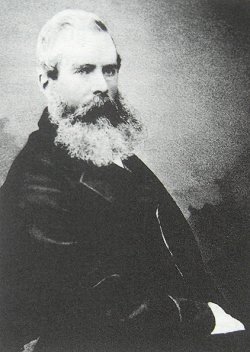 William
Bide was born in
Yeovil in 1809,
the son of
William Bide
(1780-1829) and
his wife,
Elizabeth née
Mullins
(1781-1864).
William and
Elizabeth were
to have six children;
Elizabeth (1807-1881),
William (1809-
1864), Mary
Ann (1812-1857)
Louis
(b1813, Paris,
d1885,
Gloucester),
John (b1814)
and Susan
(1817-1830).
William
Bide was born in
Yeovil in 1809,
the son of
William Bide
(1780-1829) and
his wife,
Elizabeth née
Mullins
(1781-1864).
William and
Elizabeth were
to have six children;
Elizabeth (1807-1881),
William (1809-
1864), Mary
Ann (1812-1857)
Louis
(b1813, Paris,
d1885,
Gloucester),
John (b1814)
and Susan
(1817-1830).
William junior became a prominent glove manufacturer, entering his father's leather dressing and gloving business in Lower Reckleford.
Bide gave testimony at a House of Commons enquiry into Yeovil charities. At this time, aged 20, he was listed as a glover and an Overseer of the Poor and lived in Yeovil in a house called Reculver.
When questioned about Yeovil school he testified "I was at the school when a boy; at that time there used to be what were called The Romsey School and The Town School. I was at the school on the latter foundation."
William Bide was a Churchwarden at St John's in 1825, 1826 and 1827 with John Highmore and was elected again in 1838 and 1839 with Frederick Greenham. He was also a member of Yeovil's Vestry. In 1834 Bide was listed as a subscriber to William Hull’s “History of the Glove Trade”. During 1837 William was one of the founders of the "Yeovil Coal and Potatoe Charity" with the intention of aiding the second poor of Yeovil. In the 1841 census William was listed as a 30-year-old glove manufacturer. He was living with his 60-year-old mother Elizabeth his brother John and a servant at Reckleford.
In late November 1854, during the Crimean War, the Yeovil Local Patriotic Fund was created as part of the national scheme to support widows and orphans of servicemen killed in action. Support in Yeovil was instantaneous. A list of subscribers was published in the Western Flying Post's edition of 12 December 1854. On first glance it may seem that people were being less than generous until it is realised the £5 in 1854 would be worth around £600 at today's value. The total amount listed was some £427 - in excess of £50,000 at today's value - and all raised in the first week of the appeal. William Bide subscribed £20 to the fund (around £2,400 at today's value).
Among his other business interests he owned the Charlton Brewery Co Ltd at Shepton Mallet in partnership with Francis Berryman, a brewer and wine and spirit merchant of Wells from 1844. The Bide family withdrew from this business in 1865, following William’s death.
William Bide was essentially a glove manufacturer and Pigot's Directory of 1830 listed him working with his father in the company of William & William Bide in Reckleford. By 1840, as listed in the Somerset Gazette Directory, William Bide was listed on his own as a glove manufacturer in Back Kingston (today's Higher Kingston). In 1854 he became partners with John Hill and the Western Flying Post reported on the new firm that had been formed in Back Kingston called Bide & Hill. By 1866 the Post Office Directory was listing William's company as William Bide & Co of Reckleford.
Around 1828 (not 1850 as frequently recorded) he built the large leather dressing factory with a three-storey leather-dressing warehouse on the corner of Eastland Road and Reckleford, employing over 250 men and women, with more than 2,000 outworkers. These outworkers were usually women and girls who undertook sewing in their own homes, collecting and returning their bundles each week. In the outlying villages delivery of leather and collection of gloves was carried out weekly by Bide’s own transport. His account books for 1851 indicate that he held a considerable stock of 33,000 skins and finished pairs of gloves, amounting to a total value of £15,000. He also built a row of stone cottages in front of the factory, facing onto Reckleford, for his workers and at the same time provided pumps for their water supply. These houses were only demolished for the widening of Reckleford in the 1960’s.
On 12 October 1854 William married Emma Matilda Collins Willmington, the daughter of Yeovil glove manufacturer William Willmington at St Pancras in London. On his marriage certificate William was described as a gentleman, his father William Bide was dead and Emma's father, William Willmington of Yeovil, was described as a gentleman.

The report of William's return to Yeovil with his new bride, Emma, from the 7 November 1854 edition of the Sherborne Mercury.
William Bide lived in Kingston House and owned much property in Yeovil, including at least six public houses including the Sun Inn in Grope Lane (today's Wine Street) and the Oxford Inn. He was a co-founder of the Wilts & Dorset Bank and was a Churchwarden at St John’s. In 1846 became an Improvement Commissioner and a Special Commissioner and he topped the poll in the first election for Town Councillors in 1854. He was a prime mover of the Yeovil Improvement Bill and, largely as a result of his efforts, Yeovil's badly-neglected services were upgraded in the town including the provision of public water supply.
In the 1861 census William and Emma, both aged 52, were living in Kingston House with a cook, groom, housemaid and footman. William described his occupation as "Glove Manufacturer and Common Brewer and Mayor, employing 120 men, 15 boys and 1000 women ".
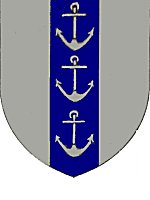 Around 1856 the
Lord Chancellor
appointed him,
along with John
Ryall Mayo and
Frederick
Greenham, as
Magistrates for
the Borough.
Bide was elected
mayor of Yeovil
twice; from 1856
to 1858 and
again from 1860
to1862.
Around 1856 the
Lord Chancellor
appointed him,
along with John
Ryall Mayo and
Frederick
Greenham, as
Magistrates for
the Borough.
Bide was elected
mayor of Yeovil
twice; from 1856
to 1858 and
again from 1860
to1862.
The Bide arms are argent, on a pale azure three anchors erect of the field (on a silver shield, a blue vertical stripe a third of the shield wide containing three anchors displayed upright).
In April 1862, William was listed among those subscribing to the new west window in St John's church in memory of Prince Albert. He subscribed £30 (around £3,300 at today's value).
He suffered poor health and died from tuberculosis on 7 August 1864 at the age of 55. The Western Gazette reported "In our obituary today we announce the death of William Bide Esq. after a long and severe illness. The deceased was a magistrate of the borough."
Emma died in 1877, aged 69. They are interred together in Yeovil Cemetery.
![]()
William Bide's
signature on his
marriage
certificate,
1854.
gallery
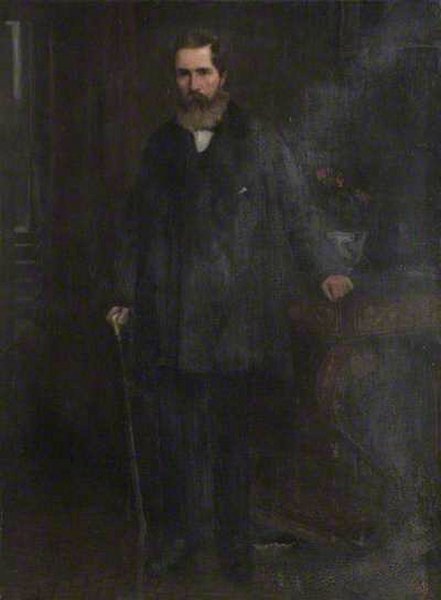
William Bide (1809-1864) of Kingston House. Oil on canvas, 55 x 41cm.
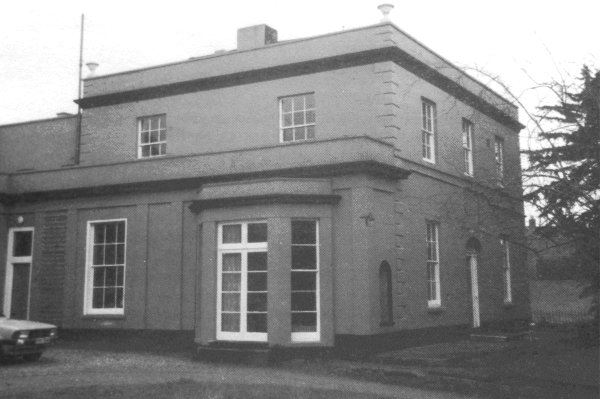
This Regency house, Kingston House, was built by Charles Vining and was the home of William Bide in the 1850s. It later became part of the Park School.
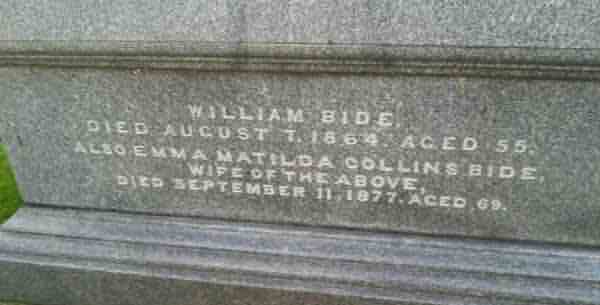
The tomb of William and Emma Bide in Yeovil Cemetery.